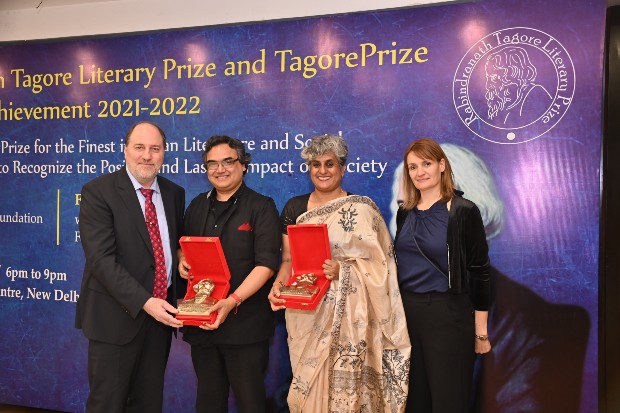New Delhi -Shobhana Kumar, Sudeep Sen, and Sanjoy K. Roy won the prize where eleven shortlists were in the race for the most coveted award ceremony, the Rabindranath Tagore Literary Prize 2021-22. Kumar and the other Tagore prize recipients received the coveted awards during a ceremony at the Multipurpose Hall, India International Centre, New Delhi attended by H.E. Freddy Svane, Ambassador of Denmark, Deputy Ambassador of Taiwan – Mumin Chen, and eminent from the literary field Ashok Vajpayee, renowned Doctor of the stars, Dr. George Gauthier II and many more.
The Rabindranath Tagore Literary Prize is a literary honor in India conferred annually to published works of Indian authors (residing in India or abroad) in novels, short stories, poetry, and drama, originally written in any of Indian official languages and dialects, but translated to English.
The Tagore Prize for Literature has been awarded annually since 2018. The awards are always handed out in Dec every year. It was the 5th edition of the prestigious award this year and the prize for the winner includes a Rabindranath Tagore statuette and a monetary award of 5000 US dollars (about INR 4,13,667) and a certificate for all shortlists. The event was recorded and is available to view for all on TagorePrize’s social media platforms.
Attended by Danish Ambassador H.E. Freddy Svane, during the event he said “The fight for freedom and peace is more important than ever. Poets and writers are often ahead of our times and express our emotions and hope eloquently and honestly. The Tagore Prize is given in this spirit.”
Peter Bundalo, Founder and CEO of Tagore Literary Prize said, “without social cohesion, poets, writers professors will be nowhere. A legacy is important for a strong India and we through the Tagore prize are making our earnest efforts to recognize the positive and lasting impacts on society and in Indian Literature. “
Sharing his delight on receiving the Tagore Social achievement award SANJOY K ROY, M.D. Teamwork Arts said, “Art matters began as an advocacy campaign to highlight the contribution of artists and artisans to our syncretic culture, tradition, and daily life. Since then the campaign has grown to support and sustain the Indian arts sector hugely impacted by covid 19. on behalf of the entire team, I thank the Tagore Awards for recognizing our efforts.”
SUDEEP SEN, a poet, translator, and editor of influential anthologies, In his moment of joy and happiness of receiving the Tagore literary award, said “I am delighted that Anthropocene has been awarded the Rabindranath Tagore Literary Prize. This book, which coalesced during the pandemic, is essentially a plea for positivity and prayer in these fervent times. Using multiple literary genres and tropes, it endeavors to address the wider geopolitics of our time. I hope this award will serve to sensitize a greater number of people to very urgent issues that need acute and immediate attention — such as climate change, and our global need for unity and humanism. ‘Hope, heed, heal — our song, in present tense’.”
This year’s TagorePrize for Literature winner SHOBHANA KUMAR spoke about the vision that Tagore had for life and living, and education, ahead of her receiving the prize on Monday. Kumar said, “ the true purpose of us as artists are not just to become archivers of the world as we experience it, but also as thinkers who question the status quo. She further added, “It is extraordinarily humbling that the founders of the Tagore Literary Prize, Mr. Peter Bundalo and his wonderful team, the jury found that my work resonates with this ideal. I believe my work as an artiste has just begun.”
In the row of her book, Rabindranath Tagore recollected his first visit to Japan in 1916 in his book Japan Jatri, where he first introduced the haiku into Bengali literature. Shobhana Kumar’s new book, A Sky Full of Bucket Lists (RedRiver, 2021), is an important intervention to this amalgamation of the Indian style of writing poetry and Japan’s haibun body of work.


Comments are closed.